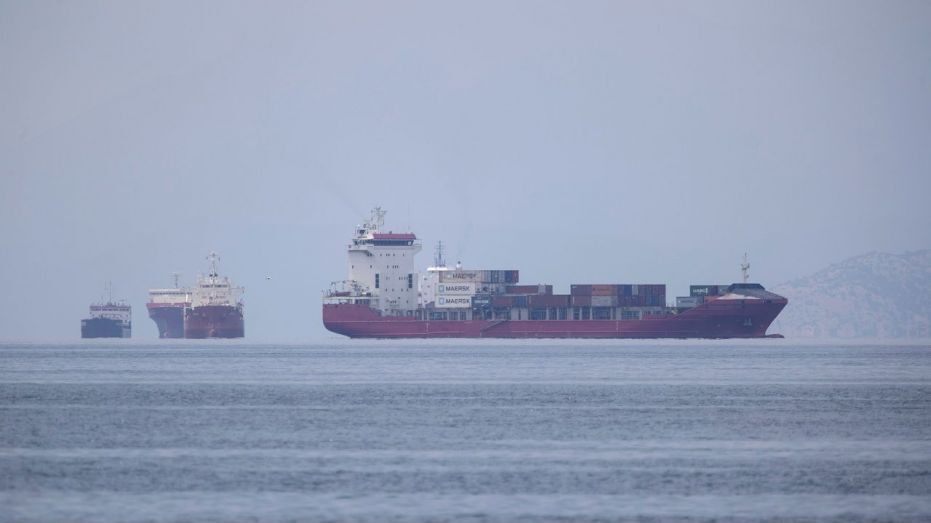Fox Business Flash top headlines are here. Check out what’s clicking on FoxBusiness.com.
The Trump administration, expanding an effort to choke off oil and fuel trade between Iran and Venezuela, is readying new sanctions against dozens of tankers while pressuring companies associated with those vessels, according to people familiar with the plans.
Continue Reading Below
The U.S. Treasury Department’s Office of Foreign Assets Control is preparing to add as many as 50 tankers to its blacklist for working with Venezuela’s Maduro government, one of the people familiar with the plans said.
Treasury officials last week sanctioned four firms and their vessels for involvement in Venezuelan oil trade. Last month, the State Department threatened sanctions against a pair of Greek-owned tankers, heading off what officials in Washington said were planned Iranian fuel deliveries to Venezuela.
The additional tanker sanctions will mark a dramatic expansion of the U.S. effort both to interrupt the revenue and commodity streams and disrupt a developing relationship between the two autocratic governments.
US FRACKERS TO ZERO IN ON RICHEST OIL FIELDS AFTER CORONAVIRUS
Five Iranian tankers have unloaded fuel desperately needed by Venezuela in recent weeks. However, those deliveries represented a diplomatic gesture that was “just a ribbon-cutting,” one of the people familiar with the matter said, given that the fuel deliveries will last the country only a few weeks.

A cargo ship approaches the port of Piraeus as other ships are anchored, near Athens, Greece, May 26, 2020. (AP Photo/Petros Giannakouris)
Iranian and Venezuelan leaders said they are planning more such deliveries, with Venezuelan President Nicolás Maduro saying he aims to secure a deal on a coming trip to Tehran.
Both countries are under U.S. sanctions pressure, which has the effect of heightening international scrutiny. U.S. efforts to blackball Iran’s shipping industry over the past two years helped cut the country’s crude exports from around 2.5 million barrels a day to an estimated 70,000 in April, according to a senior administration official.
US PROSECUTORS, PRINCE ANDREW TAKE SWIPES AT EACH OTHER OVER EPSTEIN PROBE
“We have deflagged almost 150 Iranian tankers,” said Brian Hook, the State Department’s special representative for Iran, referring to the registries required for ships to ply international waters. “And it will continue,” he said.
Venezuela’s ships are under similar U.S. pressure. As a result, both countries have tried turning to the private sector to keep their petroleum industries alive.
By threatening the marine industry with sanctions, the U.S. is embarking on new steps to stymie the Iranian-Venezuelan relationship while helping the Trump administration steer clear of a possible military confrontation stemming from other types of action at sea, U.S. officials say.
Global shipping insurance behemoth Lloyd’s of London Ltd. is investigating two major shipping companies for alleged Venezuela trade, according to one of the people familiar with the matter. Lloyd’s is looking into possible ties of the companies, including Dynacom Tankers Management Ltd., to vessels blacklisted by the U.S. last week, the person said. Lloyd’s and Dynacom didn’t respond to requests for comment.
RESEARCHERS SAY THIS EVENT POSES BIGGEST RISK TO US ECONOMY RIGHT NOW
Other possible U.S. sanctions targets include companies allegedly run by the U.S.-blacklisted Colombian businessman Alex Saab Morán and tied to the Maduro family, according to a senior U.S. official.
Mr. Saab last year was sanctioned and indicted for allegedly laundering money for the Venezuelan regime.
Messrs. Saab and Maduro have rejected the allegations as U.S. propaganda.
Other companies under scrutiny are tied to four vessels sanctioned last week, including the Voyager 1, according to the people familiar with the matter. Voyager 1 is operated by Greece-based NGM Energy SA, which also operates the Respect, a vessel that loaded Venezuelan oil in November despite U.S. sanctions, according to a continuing case at a London commercial court.
NGM Energy didn’t immediately respond to a request for comment.
Levying another form of pressure, the Trump administration last month issued special industry guidance to address illicit shipping and sanctions-evasion practices.
The advisory, issued by the Treasury and State departments together with Coast Guard, detailed the type of activities that should trigger red flags for insurers, brokers, banks, shipping agents and other businesses supporting the maritime industry. Failure to follow those standards puts those firms at risk of major fines and other penalties if found transacting with sanctioned entities.
The advisory red-flagged practices such as multiple ship-to-ship transfers, a practice that helps obfuscate a product’s true origin, and gaps in the transponder-tracking data required for all commercial vessels that can help hide illicit trade.
The U.S. also warned in the advisory that a new blacklist of vessels should be expected, a prospect that can tank a shipping company’s ability to conduct business in global markets.
In the aftermath of the U.S. advisory, a host of ships were dropped by shipping registries, according to U.S. and industry officials.
GET FOX BUSINESS ON THE GO BY CLICKING HERE
According to people familiar with the matter and Wall Street Journal research, several of those ships were tied to a network of companies owned or managed by Giorgios Gialozoglou and his son, Marios, who are being investigated by the U.S. for allegedly facilitating sanctions evasions, according to another senior U.S. official. Four of their vessels — the Bella, the Bering, the Pandi and the Luna — were among the first wave of planned deliveries of Iranian fuel to Venezuela, according to those people.
Marios Gialozoglou declined to comment, as did representatives for the companies and the owners.
CLICK HERE TO READ MORE ON FOX BUSINESS
The Gialozoglous manage or own a network of Piraeus, Greece-based companies with more than a dozen other fuel and oil tankers, many with records of multiple ship-to-ship transfers and long transponder gaps, according to industry data. Another of their vessels was impounded by Saudi-backed Yemen authorities concerned about a delivery of fuel to the Iran-backed Houthis.
Transponder data showed another Gialozoglou-linked tanker, the Junior G, adjacent to the Pandi off Iran’s coast late last week “awaiting orders,” according to shipping data from MarineTraffic, a tracking website.


